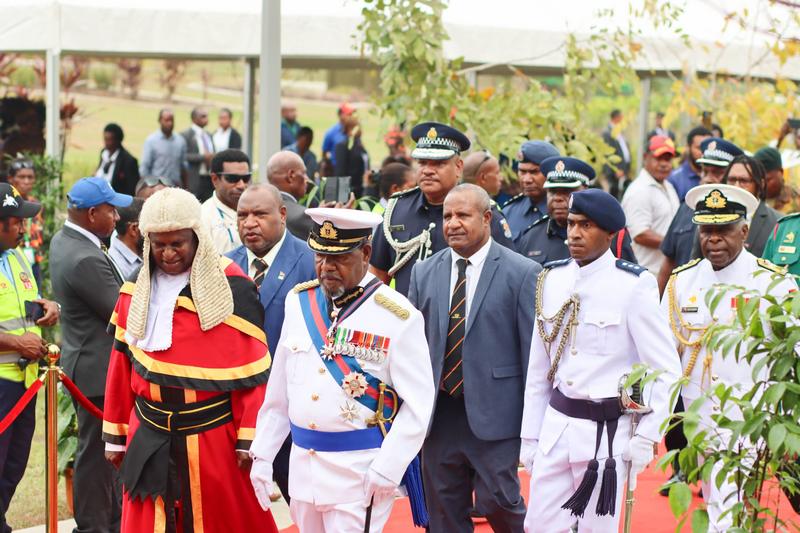Papua New Guinea Prime Minister James Marape, alongside Governor-General Bob Dadae and Chief Justice Gibbs Salika, officially opened the new National and Supreme Court Complex at Waigani on 10 September, describing the K653 million project as a national investment in democracy and institutional stability.
Positioning the development as a cornerstone for the country’s governance and business environment, Prime Minister Marape said the new court complex represents “a national monument to justice and democracy” as PNG marks 50 years of independence.
“This building is an investment in the very core of our democracy and justice. It is a monument in our nation’s 50th year to the rule of law and the protection of our court system so that it remains independent, functional, and vital to keeping our country united,” Prime Minister Marape said.
The complex, regarded as one of the most modern judicial facilities in the southern hemisphere, was first initiated in 2016 under former Chief Justice Salamo Injia and former Prime Minister Peter O’Neill. Since 2019, the Marape Government has provided more than K400 million to complete the project. Mr Marape stressed that the funding came entirely from Papua New Guinea’s own budget.
“For the first time, we have delivered a facility of this standard, fully financed by our country. It symbolises that our nation must live under one law, with courts resourced to deliver justice free of influence or intimidation,” he said.
A Milestone for the Judiciary
Chief Justice Salika, in his keynote remarks, expressed deep humility and pride in welcoming dignitaries to what he called “one of the most important milestones in the life of our nation’s justice system.”
He paid tribute to past leaders, including prime ministers and chief justices who supported the vision of a modern judicial facility, and honoured the widows and families of PNG’s pioneering justices for their enduring contributions.
Construction of the complex began in 2017, and Chief Justice Salika emphasised that it was “funded fully, fully and completely by the people of Papua New Guinea.”
The facility features 15 modern courtrooms, advanced digital infrastructure, e-justice systems, and dedicated spaces for the National Judicial Staff Services.
“This building is not funded by local agencies or big partners. This is money from Papua New Guinea, our own money, our own people,” he said, highlighting its national significance.
The Chief Justice commended the professionalism of contractors China Railway Construction Engineering (PNG) Ltd, Peddle Thorp Australia, and local firms, who delivered the project despite supply shortages, funding pressures, and the COVID-19 pandemic. He also acknowledged engineers, artisans, and public servants whose efforts made the vision a reality.

Economic and Commercial Significance
For the business community, Marape underscored the economic importance of judicial independence. He noted that case backlogs, once around 5,000, have been reduced to 2,000, with reforms underway to modernise case management and strengthen the three-tier higher court system.
“Our economy has grown, our population has expanded, and the complexity of cases has increased. This investment ensures that disputes—whether commercial, civil, or constitutional—are resolved in a timely, impartial manner. The stability of our judiciary is the stability of our nation, and that is critical for business confidence,” he said.
Salika added that the complex symbolises PNG’s confidence in its institutions and reflects unity.
“Justice is not the privilege of a few people. It is a right of all. That is why there is no gate, no fence at the front of this community, because we know the importance of open access to justice,” he said.
He also paid special tribute to judges past and present, recalling his own 35 years on the bench and honouring colleagues who passed away during the construction period. He acknowledged the foresight of his predecessor, Sir Salamo Injia, who initiated the vision for the project.
Salika said the building should inspire future generations. “Let this complex be a heart of justice for generations to come. The rule of law is not just an idea; it is seen in reality. May this institution inspire us all to build a society that is more just, fairer, and more united,” he said.
The opening ceremony was attended by distinguished guests, including the Chief Justice of the Federal Court of Australia, regional judicial counterparts, members of the diplomatic corps, and representatives of the business community.
Prime Minister Marape cut the ribbon to mark the official opening and pledged that the court’s doors would always remain open to every Papua New Guinean and those doing business in the country.
“May this door never close to any Papua New Guinean seeking justice. This building is a symbol of who we are and what we aspire to be—a nation bound by fairness, equality, and democracy,” PM Marape added.










